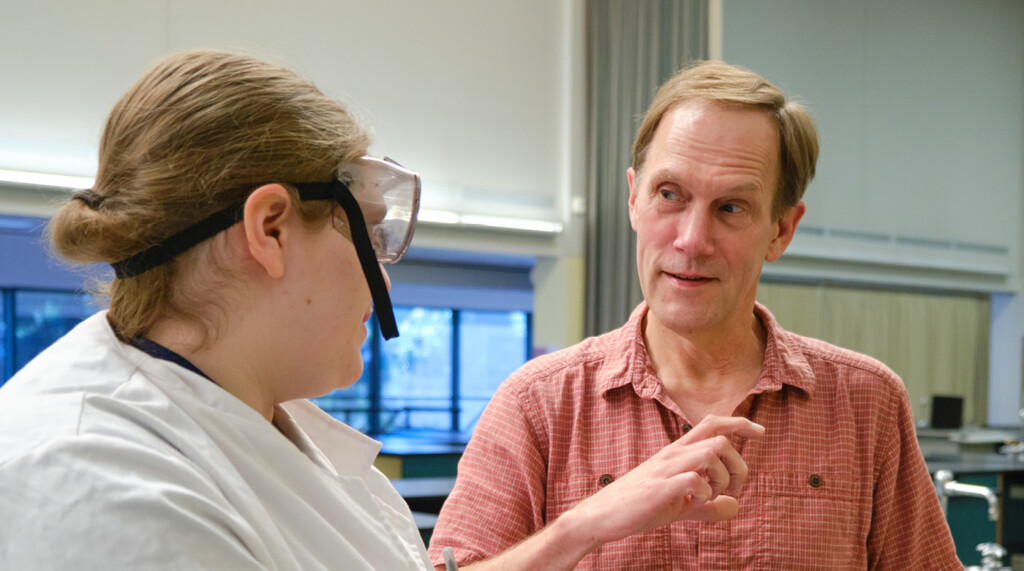Page 16 • (1,156 results in 0.02 seconds)
-

Washington, D.C. (March 20, 2017)- When Scott Foss ’91 enrolled at Pacific Lutheran University, he dreamed of becoming a paleontologist and pursuing a career outdoors conducting research. Now, he’s a senior paleontologist at the Department of the Interior. Foss serves as a policy adviser and…
management chops on the American West, serving as a National Park Service paleontologist and museum curator at the John Day Fossil Beds National Monument in Oregon, and later as a regional paleontologist with the Bureau of Land Management headquartered in Utah. Along the way, he earned a Ph.D. in biological sciences from Northern Illinois University. In 2012, Foss relocated to Washington, D.C., to assume his current role, one he likens to an orchestra conductor. “I don’t get to play an instrument anymore
-

“It’s like clicking Legos together,” she says. Except that the Legos are chemical compounds contained in an 1 H NMR tube. Chemistry major Angela Rodriguez Hinojosa ’24 lights up when talking about her role in the Murdock Trust-funded research on RNA detection . A collaboration…
biological sample. It’s graduate-level research—and for Angela, comes after taking just one year of organic chemistry. Though Angela’s path has been less traditional, she’s realized it’s not something to be embarrassed about, but to embrace and celebrate. In 2020, when struggles in her personal life began to affect school, Angela’s advisor, chemistry professor Justin Lytle, suggested that she take some time away. Initially she was discouraged, worried that if she stepped away from school she might not
-

PLU Chemistry professor Dean Waldow hopes to one day become useless. After all, as an educator, his job is to empower students to work confidently and independently in a field that is constantly innovating. He does this by bringing students into his lab to help…
find ways to improve organic transistors for possible use in biological and medical applications. He acknowledges that while his research may not lead to any “earth-shattering contributions” to the chemistry world, the field of science moves forward on the backs of many minor discoveries. “It’s hard for one research group to really make a major kind of contribution, but trying to help the field progress toward more effective batteries, which hopefully will help us move away from the effects of
-
By the end of their first year, minors should have taken 2 Anthropology 100 level courses and: know and use anthropological concepts know the major perspectives of anthropology (linguistic,
Cumulative Competencies for the Anthropology Minor Level I: Anthropology 100 Level CoursesBy the end of their first year, minors should have taken 2 Anthropology 100 level courses and: know and use anthropological concepts know the major perspectives of anthropology (linguistic, cultural, archaeological, biological) and be familiar with the general orientation of the two of these perspectives appreciate and be aware of the diversity of humans in space and time understand the effects of social
-
The Research Experience for Undergraduates (REU) Program in biophysics is funded by the National Science Foundation to support ten highly qualified students to undertake interdisciplinary, supervised research projects at Clemson University, for a period of 10 weeks each summer. The projects are designed to give…
biological problems, and the contributions that biologists can make on physical problems. The focus is on cross-disciplinary training. The program includes a week-long biophysics boot-camp, a biophysics seminar series, a research tools workshop, a professional development workshop, a journal club, off-campus field trips, and social activities. Program participants regularly present their research to, and hear about the research conducted by, their peers. By the end of the program, participants present
-
The Agricultural and Environmental Chemistry Graduate Group at the University of California – Davis is holding a virtual information session on Tuesday, November 16th, at 6 pm PST. Our group focuses on applying chemistry to solve problems, both in California and around the world. We offer PhD and MS degrees…
, Biological and Toxicological, Food and Wine, and Fiber and Polymer Chemistry. To register for our Zoom information session, please use the following registration link. At this session we will discuss our program and campus, suggestions for applying to graduate school, and tips for graduate school success. And there will be plenty of time for your questions. Agricultural and Environmental Chemistry is the oldest interdisciplinary Graduate Group at Davis. We are committed to the UC Davis Principles of
-
Major in Psychology 42 semester hours, including: PSYC 101, 242, 499 One of PSYC 310, 315, 320, or 330 Two of PSYC 440, 442, 448, or 481 At least 2 semester hours from PSYC 495, 496, or 497 12
, 499 One of PSYC 310, 315, 320, 330 One of PSYC 440, 442, or 448 At least 2 semester hours from PSYC 495, 496, or 497 12 semester hours of elective psychology courses STAT 232 (psychology class) and accompanying lab 20 semester hours in mathematics and other natural sciences are required. Of the 20 hours, at least 4 semester hours must be in mathematics and at least 8 semester hours in biology. Those students who, after graduating from PLU, plan to enter schools of dentistry, medicine, public
-
The Center for Computational Sciences at Mississippi State University is accepting applications for its new REU program in computational methods applied to materials science. Learn more at their website: https://www.ccs.msstate.edu/conferences/REU2020/ or see the flyer below.
2020 REU at Mississippi State University Posted by: alemanem / March 10, 2020 March 10, 2020 The Center for Computational Sciences at Mississippi State University is accepting applications for its new REU program in computational methods applied to materials science. Learn more at their website: https://www.ccs.msstate.edu/conferences/REU2020/ or see the flyer below. Read Previous $3,000 Minority Women in STEM Scholarship Read Next A Free Webinar on Careers in Worker Health and Safety! LATEST
-
Georgia Tech will be hosting 10 undergraduate researchers this summer at Georgia Tech in their REU program focused in Aquatic Chemical Ecology. The program website includes program details, contact information, and instructions for application. The application deadline is February 15, 2017 . The full-time,…
a stipend of $5000 plus accommodations with kitchen facilities in university housing, and help with travel expenses to and from Atlanta. The research theme of Aquatic Chemical Ecology is broadly interpreted with three core areas of research for students to choose from: Biological and geochemical transformations of chemicals in aquatic ecosystems; Sensory biology and ecology of aquatic chemical communication; Ecological roles and consequences of chemicals in aquatic environments. This program is
-

The anthropology department is thrilled to present our senior capstone presentations. Students will share their projects and will answer questions.
Fictive Kinship? Presentation 10:20 a.m. - Sammie Carper Siblings of Ill Children: Childhood Agency and Its Impacts on the Family as a Whole Presentation 10:40 a.m. - Ji Larson How Reconnecting with Biological Family Impacts Identity Among Chinese Transnational Adoptees Presentation 11:00 a.m. - Dalton Bush Bastions Against the Cold: Analyzing the Agency and Climate Change Resistance Exemplified in Ming Fortifications Presentation Capstone Karen RuizKaren Ruiz Guaymi Autonomy in Cerro Colorado
Do you have any feedback for us? If so, feel free to use our Feedback Form.


